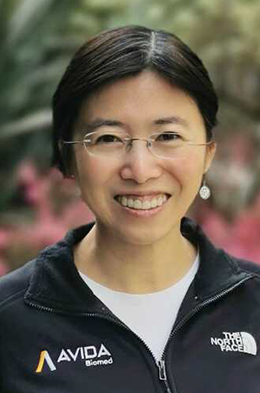Grace Zhao is a co-founder of Avida Biomed, a biotech start-up specializing in genomic technology innovation for molecular diagnostics. At Avida, Grace co-invented Point-n-Seq, a new platform technology to advance liquid biopsy for early detection of cancer and other diseases. Utilizing the ultra-efficient, hybridization-based pre-amplification enrichment of target molecules from nanogram level cell free DNA (cfDNA), Point-n-Seq enables the first targeted mutation and methylation cfDNA dual analysis solution on market. Grace is currently the head of clinical research defining and executing company-wide clinical research strategy.
Before Avida, Grace co-founded AccuraGen, which focused on accurate genomic solutions for cfDNA based liquid biopsy. AccuraGen has developed a series of products for cancer molecular diagnostics for the China market. As the director of research, Grace co-invented the core technology and managed a cross-continental research team, as well as the company’s numerous clinical collaborations. Grace received her PhD from UCSD, followed by a postdoctoral training at Stanford School of Medicine.
Marketsandmarkets took this opportunity to pick her brains on the newfound developments in the fields of genetic sequencing and the ways this research has been of paramount importance in overcoming the challenges of the pandemic. She also discusses her own learnings in the field, their presentation at the Conference their take on the conference program.
Question: What are the recent advances in the genetic sequencing field and current challenges that need immediate attention?
Grace:
More recently, a great deal of focus has been on accurate detection of methylation changes in the circulating tumor DNA (ctDNA) of a patient’s plasma. Finding these integral changes can have broad implications for translational applications concerning human cancer, both with the potential for early diagnosis including prognosis, as well as clinical management. Targeted Methylation Sequencing (TMS) using next generation sequencing (NGS) is highly capable of interrogating a large number of biomarkers in parallel, which greatly increases the detection power compared to traditional qPCR-based assays where only a few biomarkers can be analysed at a time. Often, the sensitivity of conventional TMS is compromised by low efficiency in recovering methylation markers during processing, and in the case of very large panels, the specificity is further hampered by noisy non-specific markers. Another major deterrent of using the existing technology on the market can be the cost of sequencing these large panels which cover more than ten million base pairs, along with the time requirements to perform these laborious protocols. The high cost, high computational demand, and ultimately, the limited sensitivity, becomes even more pronounced when using whole genome bisulfite sequencing as a part of the cancer detection strategy.
At Avida Biomed, we developed Point-n-Seq™﹘a novel and highly efficient DNA enrichment technology enabling the first hybridization-based NGS analysis that uses a small, focused panel (10-1000 markers) with unprecedented sensitivity. Our technology addresses the challenge presented by the current methylation analysis method, which is only compatible with big capture panels, typically 50k base-pairs and above, in size. The Point-n-Seq technology not only addresses the demand of high sensitivity detection with small input (which is often the main limitation of cfDNA), but also provides a briefer, more simplified workflow.
While liquid biopsy has broadly been used in clinical studies and diagnostic assay development, it is still limited by the amount of circulating tumor DNA (ctDNA) available in a practical blood draw. This trace amount of detectable ctDNA requires maximal utilization of the input for each assay. By leveraging the Point-n-Seq technology, a dual targeted sequencing analysis has been developed for both methylation and genomic alterations without sample splitting, providing a great new opportunity to unlock the full potential of cell-free DNA (cfDNA)-based liquid biopsy.
Question: What is the key take away point from your presentation topic which will help in building the knowledge base of attendees?
Grace:
1) The Point-n-Seq assay supports flexible panel sizes ranging from 3 Kb-1 Mb+ with unique advantages for a small, focused panel.
2) Best-in-class performance, with only 50% processing time and 1/3 hands-on performing assay time, compared to current methylation protocols.
3) The Point-n-Seq Targeted Methylation Kit provides the only end-to-end kit solution for cfDNA methylation analysis on the market with the highest percentage of molecular recovery and uniformity. Our methylation assay achieved 0.003% analytical sensitivity using a 1 mL plasma sample at a specificity of ~90% when stage I CRC detection rate is typically 70%, and that of stage I NSCLC detection is close to 85%.
4) The Point-n-Seq DUO kit is the first solution of its kind available enabling both genomic and epigenomic analysis with a turnaround time of a single day, and that includes no sample splitting.
5) Point-n-Seq Kits are automation compatible to facilitate the development of distributable, diagnostic cfDNA-based, cancer liquid biopsy assay

Grace Zhao is our esteemed speaker Advanced Genetic Sequencing Virtual Conference scheduled to be held on 23-24 September 2021 She will be presenting on the Day 2 of the conference on the topic – ‘Dual methylation and mutation analysis from a single input of plasma cfDNA without sample splitting’
To Know more about the presentation, visit our website – https://bit.ly/379gY85
If you wish to learn a great deal from her about the practice of sequencing in healthcare domain then register online or email [email protected] to book your slot at the conference.





